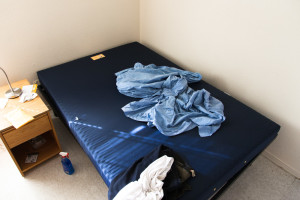Tags
Related Posts
Share This
Bed Bugs

Though the on-campus mattresses are sealed in plastic, this does not repel bed bugs. Photo by Amanda Tyler
On the week of Nov. 4, SFUAD residents Nick Martinez and Martinez’ roommate, who wishes to be unnamed, were asked to evacuate their Mountain View Apartment due to an unexpected infiltration of bed bugs.
Martinez, who had spent that weekend ill in bed, had attributed his past discomfort to the amount of time he spent outdoors and around mountainous areas, but once Anthony Dion, SFUAD’s contracted Ecolabs terminator, came in to investigate, Dion reportedly found Martinez’s mattress full of the quarter inch parasites.
“My mattress was ground zero,” Martinez says. “There were stains all over it, bed bugs as big as my pinkie nail.” The evidence, Martinez explains further, was hard to identity due to the color of the dark blue mattress.
Though Martinez heard Dion report to maintenance that the source was Martinez’s mattress, later housing director Connor Nelson reported that it was actually a couch left to Martinez’s roommate by the previous apartment resident that brought the quick-spreading visitors. According to Martinez, the previous resident had bought the couch as a secondhand furniture piece from Goodwill.

Beware secondhand furniture!
Used furniture, Connor explains, is usually a “very common cause” of bed bugs for any campus or hotel. “Which is why it’s somewhat of a bad idea to buy upholstered furniture from thrift stores, or if you find it at an art sale, or just on the street corner.”
If a piece of furniture has been infested, the bed bugs will die off if put in an extreme temperature environments. “General cleanliness kind of helps with the situation,” he adds, “but it’s not the cause. Some people think that you only get them if you are messy, but no, it can happen anywhere. But if you’re in an apartment that’s messy it just complicates the problem. It gives them more of an environment.” And as a rule of thumb, Connor says, if secondhand items like clothes should be immediately sent through the dryer.
However, because these instances of bed bugs are rare and originating from an outside source, Connor reassures that there is no cause for campus concern. Since the campus’ transfer to Laureate, the school’s furniture has been replaced. The blue plastic-sealed mattresses in every hall and apartment “are made so that bugs can’t get into them,” Connor says. And while inside the “little seams” of other mattresses, bugs can begin to compile, the fully wrapped mattresses make it impossible for them to linger anywhere but on the surface. In addition, “in most of our buildings,” Connor adds, “the floors aren’t carpeted. Our rooms are tile and that makes it harder for the bugs to spread.”
In some instances, Connor jokes, some students “wake up with a bite” and “automatically think it’s bed bugs…, one time, a student was just allergic to fabric softener.” There are, he explains, ways in which you can tell if there are bed bugs in your room. “On the furniture, you would see like stains,” Connor says, “and apparently they have a tendency to bite around the ankles. If someone suspects that they have them, they should let us know right away because the pest company can confirm, they’ll look for stuff like this and if they don’t see bugs, they’ll leave glue traps under the bed, then they’ll come back in a week and be able to see.”
According to the procedures of Ecolab’s bed bug termination, the inspection of the housing must warrant the non-fumigating treatments and once executed, it’s suggested that the areas remain evacuated for two weeks. The Ecolab website, additionally read that “Ecolab will inspect and treat all infested and adjacent rooms according to Ecolab’s patent pending service protocol.” As such, the apartment of Martinez and Campbell were treated as well.
Though there has been no official record, Director of Facilities and Security Peter Romero shares that the invoice for the apartment was estimated at $2,000. The residents, however, are not being charged any damages.
For more information on bed bug prevention, watch the following video from the Ecolab’s website:






 Jackalope Magazine is the student magazine of Santa Fe University of Art and Design. Building on the interdisciplinary nature of our education, we aim to showcase the talent of our university and character of our city.
Jackalope Magazine is the student magazine of Santa Fe University of Art and Design. Building on the interdisciplinary nature of our education, we aim to showcase the talent of our university and character of our city.
Recent Comments